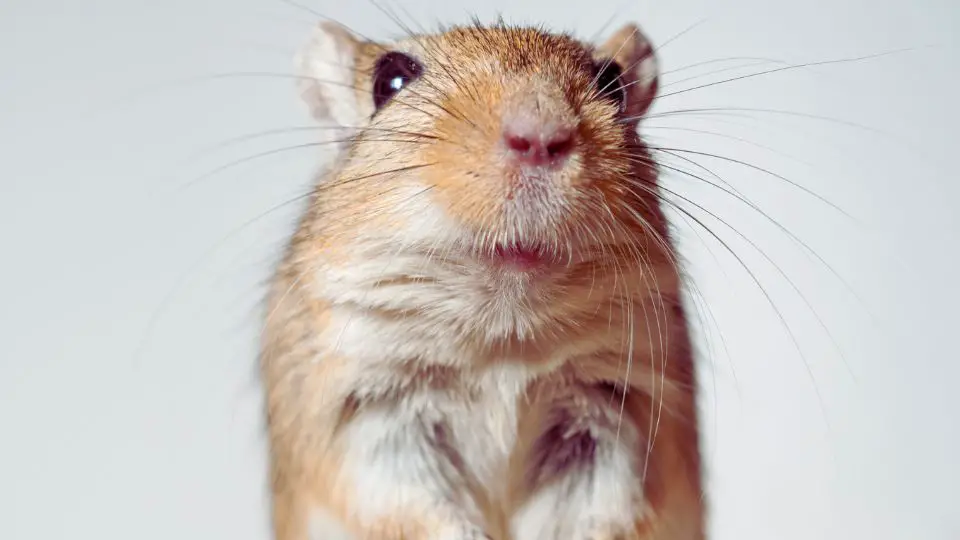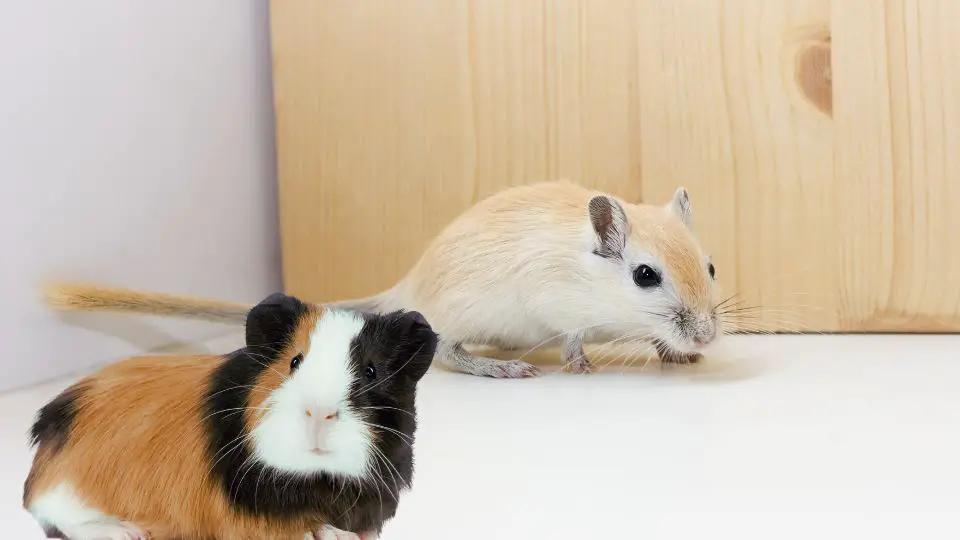Having a gerbil that is scared of you can be a concern for any pet owner. Understanding the reasons behind your gerbil’s fear is important to help create a nurturing and trusting relationship.
Your gerbil may be scared of you due to various reasons, such as their natural instincts, lack of socialization, past negative experiences, or unfamiliarity with your presence. You have to approach them with patience, provide a calm environment, and gradually build trust through positive interactions.
In this article, we will explore common factors that may contribute to a gerbil’s fear and provide insights on how to address these issues, allowing you to build a stronger bond with your furry friend.
Gerbil Behavior and Sensitivity
In the wild, gerbils are prey animals, constantly on alert for potential predators. Their survival instincts have honed their senses to be highly sensitive, allowing them to detect and react to any potential threats in their environment. This sensitivity to their surroundings helps gerbils stay vigilant and avoid danger.
One aspect of gerbil behavior that reflects their sensitivity is their response to sudden movements. Sudden and quick movements can startle gerbils, triggering their natural instinct to perceive it as a potential threat. This sensitivity is a protective mechanism that has developed over generations to ensure their survival.
Gerbils also have a keen sense of smell, which plays a significant role in their behavior. They use scent to communicate with each other, mark their territories, and identify familiar individuals. Unfamiliar scents, including the scent of humans, may initially trigger a cautious or fearful response from gerbils. It takes time for them to become accustomed to new smells and associate them with safety.
Understanding the natural instincts and sensitivities of gerbils can help us approach them with patience and empathy our small pet. Building trust and creating a calm environment are essential for gerbils to feel secure and comfortable in their surroundings. By gradually introducing them to new experiences, avoiding sudden movements and loud noises, and allowing them to adjust to unfamiliar scents at their own pace, we can foster a positive and trusting relationship with our gerbil companions.
Lack of Trust and Socialization
Gerbils, like many small animals, are naturally cautious creatures. They rely on their instincts to assess their surroundings and determine whether or not they are safe. As prey animals, they have an innate fear response to potential threats. When a gerbil lacks trust, they may exhibit signs of fear or anxiety, such as retreating, hiding, or avoiding interaction with their owners.
Proper socialization during a gerbil’s early stages of life is crucial for them to develop trust and become comfortable with you. Socialization involves gradually introducing gerbils to different stimuli, including human touch, voice, and presence. It allows them to become accustomed to these experiences and learn that they are not threatening.
In our experience, gerbils that have not been adequately socialized during their early development stages may have a fear or skittishness around humans. They may perceive interactions as stressful or uncomfortable due to the unfamiliarity of human presence. This lack of socialization can hinder the bond between gerbil and owner and make it challenging to establish trust.
To address a lack of trust and insufficient socialization, patience and a gradual approach are key.
Start by creating a calm and quiet environment for your gerbil, allowing them to acclimate at their own pace. Offer them treats or food from your hand to associate your presence with positive experiences. Additionally, spend time near their enclosure, talking to them in a soothing voice, and avoid making sudden movements that might startle them.
Negative Experiences and Trauma
Gerbils have a remarkable ability to remember negative experiences, even if they occurred in the past. Traumatic events, such as loud noises, sudden movements, or mishandling, can leave a lasting impression on gerbils and trigger fear responses in similar situations. If your gerbil was previously exposed to harsh or threatening circumstances, it’s essential to approach them with patience and sensitivity to help them regain trust.
You should create a safe and calm environment for your small pet if you noticed that it has experienced trauma or negative encounters. Start by ensuring their enclosure is secure and free from potential hazards that could startle or harm them. Provide plenty of hiding spots, tunnels, and enrichment items to create a sense of security. Gerbils thrive in an environment where they feel protected and have spaces to retreat to when they feel overwhelmed or anxious.
Avoid loud noises, sudden movements, or any other triggers that may remind your gerbil of their past negative experiences. This can help prevent further stress and anxiety. Speak softly and move slowly around your gerbil to minimize their stress levels.
Patience, Bonding, and Positive Reinforcement
When dealing with a scared gerbil, it’s important to approach them with patience, understanding, and a gradual approach. Building trust takes time, but with dedication and positive reinforcement, you can create a stronger bond with your gerbil and help them overcome their fears.
Gradual Approach
- Scared gerbils may require more time to adjust to new situations or interactions.
- Avoid rushing or forcing your gerbil to engage in activities they find overwhelming.
- Give your gerbil the space and time they need to feel comfortable and secure in their environment.
- Respect their boundaries and allow them to approach you at their own pace.
Benefits of Bonding Activities and Positive Reinforcement Techniques
- Engage in bonding activities that promote trust and strengthen the bond between you and your gerbil.
- Spend quality time near their enclosure, talking to them in a calm and soothing voice.
- Offer treats or favorite foods from your hand to associate your presence with positive experiences.
- Use gentle strokes or gentle touches to acclimate your gerbil to physical contact.
- Introduce interactive toys or puzzles to stimulate their curiosity and provide positive experiences.
- Implement clicker training or target training to establish positive associations and encourage desired behaviors.
- Be consistent in your interactions, dedicating regular time for bonding activities.
- Remain calm and patient during interactions to create a relaxed and positive environment.
How do you get a gerbil to trust you?
Building trust with a gerbil requires patience, consistency, and a gentle approach. Here’s a step-by-step guide to help you get your gerbil to trust you:
Step 1: Create a Safe and Comfortable Environment
Ensure that your gerbil’s enclosure provides a secure and stress-free environment. Include hiding spots, tunnels, and bedding material for them to feel safe and secure.
Step 2: Give Them Time to Adjust
When you bring a new gerbil home, allow them a few days to settle into their new surroundings without attempting direct interaction. This gives them time to get accustomed to their new environment and reduces stress.
Step 3: Associate Your Presence with Positive Experiences
Sit near the gerbil’s enclosure and speak to them in a soft, calm voice. Offer them treats or their favorite foods through the cage bars to establish a positive association with your presence. This helps them learn that your presence brings positive experiences.
Step 4: Slowly Introduce Your Hand
Once your gerbil is comfortable with your presence, start introducing your hand slowly and gently into their enclosure. Place your hand near them without making any sudden movements. Allow them to approach your hand on their own terms, sniffing and investigating it.
Step 5: Offer Treats from Your Hand
Extend your hand with a treat or favorite food, such as a small piece of their preferred vegetable or a small treat designed for gerbils. Let the gerbil take the treat from your hand, reinforcing the positive association between you and tasty rewards.
Step 6: Gradually Increase Interaction
Over time, increase the duration and frequency of your interactions. Start by gently stroking your gerbil’s back or head, always being mindful of their comfort level. Observe their body language and adjust your actions accordingly. If they show signs of stress or discomfort, give them space and try again later.
Step 7: Be Consistent and Patient
Building trust takes time, so it’s essential to be consistent in your interactions and patient with the process. Every gerbil is unique, and the timeline for building trust may vary. Respect their boundaries and always prioritize their comfort and well-being.
Step 8: Establish a Routine
Gerbils thrive on routine, so establish a consistent schedule for feeding, cleaning, and interacting with them. Predictability helps them feel secure and builds trust over time.
Step 9: Avoid Sudden Movements or Loud Noises
Gerbils are sensitive to sudden movements and loud noises, which can startle or frighten them. Be mindful of your actions around them and ensure a calm and quiet environment during interactions.
Remember, building trust is a gradual process, and it may take weeks or even months for your gerbil to fully trust you. Each gerbil has its own unique personality and experiences, so be patient and adjust your approach accordingly. With time, consistency, and gentle interactions, you can develop a strong bond of trust with your gerbil.
FAQ
How do you calm a scared gerbil?
To calm a scared gerbil, create a quiet and peaceful environment by reducing noise and sudden movements. Speak softly and move slowly around them. Offer treats or their favorite foods to associate your presence with positive experiences. Avoid forceful handling and give them space to retreat to their hiding spots if they feel overwhelmed.
How long does it take for a gerbil to get used to you?
The time it takes for a gerbil to get used to you can vary. Some gerbils may become comfortable with your presence and interactions within a few weeks, while others may take several months. It’s important to be patient, consistent, and respectful of their individual needs and comfort levels.
What are gerbil warning signs?
Gerbils may display certain warning signs when they feel threatened or stressed. These signs can include thumping their hind legs on the ground, standing on their hind legs to get a better view of their surroundings, puffing up their fur, squeaking or chirping loudly, and biting or nipping. These behaviors indicate that the gerbil is feeling fearful or defensive, and it’s important to give them space and reassess their environment to reduce their stress.
Conclusion
Building trust and overcoming fear requires patience, understanding, and a gentle approach. By addressing the factors that contribute to your gerbil’s fear, providing a calm and secure environment, and gradually introducing positive experiences, you can help your gerbil feel more comfortable and less scared.
Remember, each gerbil is unique, and it may take time for them to fully trust you. Be consistent, be patient, and prioritize their well-being to create a loving and trusting relationship with your gerbil.







